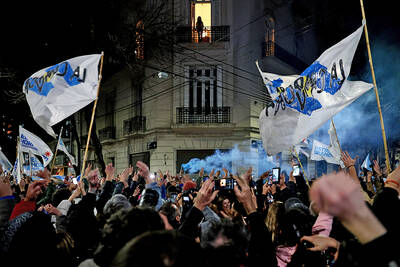The top US military commander yesterday visited Marjah, the frontline of US-led operations against the Taliban in southern Afghanistan where troops are gearing up to widen the fight to Kandahar in June.
Admiral Mike Mullen, chairman of the US Joint Chiefs of Staff, was in the battle zone a day after US President Barack Obama left Afghanistan after a surprise visit, pledging to defeat the Taliban and “to get the job done.”
Operations in the farming community of Marjah, set in poppy fields and desert in Helmand Province, are the first test of the US’ counter-insurgency campaign aimed at ending an increasingly deadly war now into its ninth year.
“Admiral Mullen is in Marjah,” said Lieutenant Colonel Todd Breasseale, a spokesman for NATO’s International Security Assistance Force.
Further details of his visit were not immediately released.
The US and allies have boosted their troop numbers to 126,000, with the number set to peak at 150,000 by August as the fight expands from Helmand into Kandahar Province, the heartland of the insurgency.
Obama has said he wants to start drawing down troops from the middle of next year, putting pressure on Afghan President Hamid Karzai to take over responsibility for security by then.
During his five-hour overnight visit, Obama defended his sweeping new push to flush out Taliban strongholds in the south where the insurgency is concentrated.
“Our strategy includes a military effort that takes the fight to the Taliban while creating the conditions for greater security and a transition to the Afghans,” he told US and NATO troops at Bagram Airfield outside Kabul.
Military and political efforts against the Taliban around Kandahar, Afghanistan’s third-biggest city and the Islamist militia’s spiritual capital, are the next step in the US-led strategy.
In Washington, a US military official said NATO forces would begin the offensive on Kandahar in June with preparatory operations already under way.
The offensive in the region “has already begun” and in Kandahar “operations will begin [in June],” the official said on condition of anonymity.
The US commander in Afghanistan, General Stanley McChrystal, told Obama by video conference earlier this month that he would take on Taliban militants in Kandahar when enough reinforcements were in place.
The commander said the military was on course to pour thousands of extra troops into the region in coming months.
He has also said that the build-up to a full operation on Kandahar had begun with initial military and political efforts, including operations to secure roads and districts.
Speaking to reporters in Washington earlier this month, McChrystal said the effort would “ramp up in the weeks and months ahead,” lasting “a significant time.”
The campaign follows the launch of Operation Mushtarak in Marjah on Feb. 13, which six weeks later appears to have largely pushed back the Taliban and given the Afghan government a chance to take control.
Upon his return to Washington, Obama stressed the immediate need for progress in Afghanistan.
“I think he is listening,” Obama said of Karzai in an interview with NBC TV. “But I think that the progress is too slow and what we’ve been trying to emphasize is the fierce urgency of now.”

LANDMARK CASE: ‘Every night we were dragged to US soldiers and sexually abused. Every week we were forced to undergo venereal disease tests,’ a victim said More than 100 South Korean women who were forced to work as prostitutes for US soldiers stationed in the country have filed a landmark lawsuit accusing Washington of abuse, their lawyers said yesterday. Historians and activists say tens of thousands of South Korean women worked for state-sanctioned brothels from the 1950s to 1980s, serving US troops stationed in country to protect the South from North Korea. In 2022, South Korea’s top court ruled that the government had illegally “established, managed and operated” such brothels for the US military, ordering it to pay about 120 plaintiffs compensation. Last week, 117 victims

China on Monday announced its first ever sanctions against an individual Japanese lawmaker, targeting China-born Hei Seki for “spreading fallacies” on issues such as Taiwan, Hong Kong and disputed islands, prompting a protest from Tokyo. Beijing has an ongoing spat with Tokyo over islands in the East China Sea claimed by both countries, and considers foreign criticism on sensitive political topics to be acts of interference. Seki, a naturalised Japanese citizen, “spread false information, colluded with Japanese anti-China forces, and wantonly attacked and smeared China”, foreign ministry spokesman Lin Jian told reporters on Monday. “For his own selfish interests, (Seki)

Argentine President Javier Milei on Sunday vowed to “accelerate” his libertarian reforms after a crushing defeat in Buenos Aires provincial elections. The 54-year-old economist has slashed public spending, dismissed tens of thousands of public employees and led a major deregulation drive since taking office in December 2023. He acknowledged his party’s “clear defeat” by the center-left Peronist movement in the elections to the legislature of Buenos Aires province, the country’s economic powerhouse. A deflated-sounding Milei admitted to unspecified “mistakes” which he vowed to “correct,” but said he would not be swayed “one millimeter” from his reform agenda. “We will deepen and accelerate it,” he

Japan yesterday heralded the coming-of-age of Japanese Prince Hisahito with an elaborate ceremony at the Imperial Palace, where a succession crisis is brewing. The nephew of Japanese Emperor Naruhito, Hisahito received a black silk-and-lacquer crown at the ceremony, which marks the beginning of his royal adult life. “Thank you very much for bestowing the crown today at the coming-of-age ceremony,” Hisahito said. “I will fulfill my duties, being aware of my responsibilities as an adult member of the imperial family.” Although the emperor has a daughter — Princess Aiko — the 23-year-old has been sidelined by the royal family’s male-only